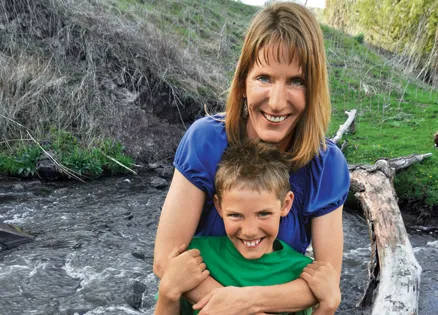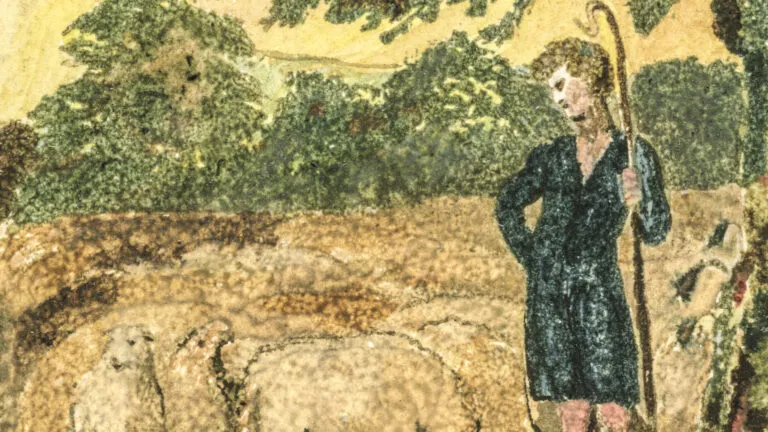“You like helping Mommy in the garden?” My 17-month-old son, Kennisen, tottered through the flower bed at the end of our property, pulling up weeds with his little hands.
Truth is, he was having more fun getting dirty than anything. Maybe it would burn off some energy before his morning nap. Kennisen walked at seven months. It was all my husband, Ken, and I could do to keep up with him. Kennisen was no ordinary kid.
I got stuck on one stubborn weed. The root was deep. Better use a spade, I thought. But I didn’t want to whale away at it with Kennisen right there. “Why don’t I get the wheelbarrow and give you a ride back to the house for your nap?” I asked Kennisen.
He nodded, looking for more weeds to yank.
I walked through the grassy ranchland toward the house, glancing back every few seconds, even waving once. Kennisen busily plucked strands of prairie grass from the dirt. It was a gorgeous early spring day. I turned to pull the wheelbarrow away from the house and swing it around.
I looked back toward the garden. Kennisen was gone. Just like that. “Kennisen!” I shouted. No reply. He never hid from me. Something was wrong.
The creek! The thought jolted me like a bolt of lightning.
I’d always thought there was little danger out here, in this quiet valley a few miles from the small town of Enterprise in northeast Oregon. Everyone knows everyone, so I never worried about my son getting lost.
But at the edge of our property, the grassland ended and dropped off sharply about 20 feet to a small creek. It seemed far for Kennisen to get to in the second my back was turned, but I knew. I just knew.
I ran to the edge and looked down. The creek was running high, swelled by a late thaw in the mountains. Icy water churned and sprayed as it coursed through the narrow gap, skipping over fallen trees and boulders.
Then I saw it. Half of a tiny footprint on the muddy precipice.
“Kennisen!” I jumped over the edge and tumbled down the incline, landing knee-deep in the snowmelt. I splashed through the water, the muddy bottom pulling off my sneakers. The cold stole my breath.
“Jesus, help him breathe!” I screamed. I clutched below the surface, pulled up only mud and branches. I kept screaming. I was nearly hoarse by the time I reached the culvert under our driveway.
He must have been swept downstream, I thought, fighting off fear and panic and despair.
I hauled myself out and sprinted inside for the phone. I was dripping wet and shivering, and covered in cuts and bruises. I dialed the sheriff. “Kennisen,” I managed to gasp, “fell in the creek. I can’t find him!”
I slammed down the phone, tore outside and plunged back into the creek, following it through the valley. At one point, the branches and debris were so thick I had to crawl. Then the creek widened before me, but I stopped.
Could he really have floated through that thicket? I turned back. What if I missed him? Lord, save him, I prayed desperately. Only you can save my boy. Please save my boy!
An all-terrain truck sped up the narrow gravel road, then ground to an abrupt halt beside me. Steve, the sheriff, and his deputy jumped out. “Kennisen…” I mumbled, my lips numb, my body shaking. Blood and muck coated me head to toe.
“Take her and go look for him at the house, just in case. If he’s here, I’ll find him,” Steve shouted to his deputy. He threw himself into the freezing water. He started to head upstream, but suddenly turned around. After about 30 yards, he reached the next thicket of debris. Steve reached in…and came back up with Kennisen limp in his arms. My son was all gray and blue. No, Lord. No…
“No pulse,” Steve said, laying Kennisen on the bank. He began chest compressions. One, two, three, four…. A neighbor arrived, another police vehicle. They took turns performing CPR. Finally the ambulance came.
Kennisen still wasn’t breathing. Everything next was a blur. My body seemed to move from place to place, without me being in control. I climbed into the ambulance with my son and we rushed to the hospital in Enterprise. Doctors worked to restore a pulse.
Only prayer kept me from totally losing it.
Then, at last, miraculously, the doctors got a heartbeat. It had been two full hours. We were put on a Life Flight to St. Luke’s Boise Medical Center, where there were better facilities to treat Kennisen.
I was staring at my son when suddenly I saw his toe clench. My heart quickened. “Did you see that?” I said to the medic.
“Probably just an unconscious reflex,” he explained gently.
My husband, Ken, rushed to meet us at the hospital. We held each other close as we kept vigil. I couldn’t help remembering how we’d held each other just 17 months before, our new baby in our arms.
“It’s touch and go,” the lead doctor, Dr. Jansen, came to tell us. “Hypothermia can sometimes protect drowning victims, but in this case, Kennisen drowned too quickly.”
Dr. Jansen explained that Kennisen’s body wasn’t cooled enough when his brain lost oxygen. He’d likely have massive brain damage if he survived, and that was a huge if.
Kennisen’s acidosis level—the ratio of acidic content to basic chemicals in the body which regulate cell function— was 7.5. No one treated at the hospital with an acidosis level above 7.3 had ever survived. “The prognosis is extremely poor,” Dr. Jansen said.
I walked with Ken to our son’s room as though walking through a terrible dream. My little boy, as still as night, eyes shut, most likely forever. I’d failed him. I wanted him to run again, be a handful. I could chase him all day. I just wanted him back.
Out of nowhere, a voice sounded. A voice I understood that only I could hear. You need to hand him over, Colby.
Hand him over? Was this God? What was God asking? For me to stop praying for my son, to instead pray that God’s will be done? All I knew was that he had sustained Kennisen this long, despite the incredible, almost unbelievable, medical odds.
The doctors and nurses had finished their work. I was all prayed out. I didn’t know how to beg God any harder. My heart was empty. It was out of the doctors’ and nurses’ hands now. It was out of my hands.
I had to accept that, accept it with all my heart, come what may. All I could do was trust in the Lord.
I fell to my knees next to Kennisen’s hospital bed, lifted my hands and said, “God, my son is yours. There’s nothing I can do. May your will be done.”
And all at once, in the midst of the greatest sadness I had ever known, I felt a stirring of peace. Finally I looked up.
Just then Kennisen threw his arm across his body, tugging the IV line, rolling on his side!
The nurse’s eyes went wide. “Doctor!” she called.
The ICU buzzed like a beehive. Kennisen was given a feeding tube in addition to his breathing tube, and put into a medically induced coma so the doctors could better monitor and analyze his condition.
Still, they held out little hope. The acidosis level, the time spent without oxygen…these were things people didn’t recover from. Not ever. It had been false hope. No hope.
That night, I sat beside my son on the bed and wondered how I should prepare for his funeral. Were there caskets for babies? Special headstones?
At once, that voice spoke to me again. Sternly, but lovingly. That isn’t my plan, it said. Don’t go down that road. Go down mine.
Four days later the doctors decided to revive Kennisen from the coma. “Please don’t hope for too much,” Dr. Jansen said.
Kennisen’s eyelids fluttered. Then they opened. His eyes scanned the room, as if taking in his surroundings.
“Kennisen?” I whispered.
Then, slowly, he moved his hand. He brought it across his chest, up to his mouth and tapped his lips. We were stunned. Speechless. All of us. My eyes welled with tears. “He’s thirsty,” someone finally said, breaking the breathless silence.
The doctors removed his tubes. Incredibly, Kennisen was strong enough to breathe and eat on his own. Later that evening, he asked for a toy. He was completely lucid.
Two days later, our son ran through the halls of the pediatric unit, pulling another child in a wagon, laughing and shouting. He was no ordinary kid. He was a miracle boy.
“In a hospital, so many times things don’t work out,” one of the nurses said to us. “But this…miracle…it gives us hope that anything is possible. Even the impossible.”
Yes, I thought. Even that.
Download your FREE ebook, The Power of Hope: 7 Inspirational Stories of People Rediscovering Faith, Hope and Love





